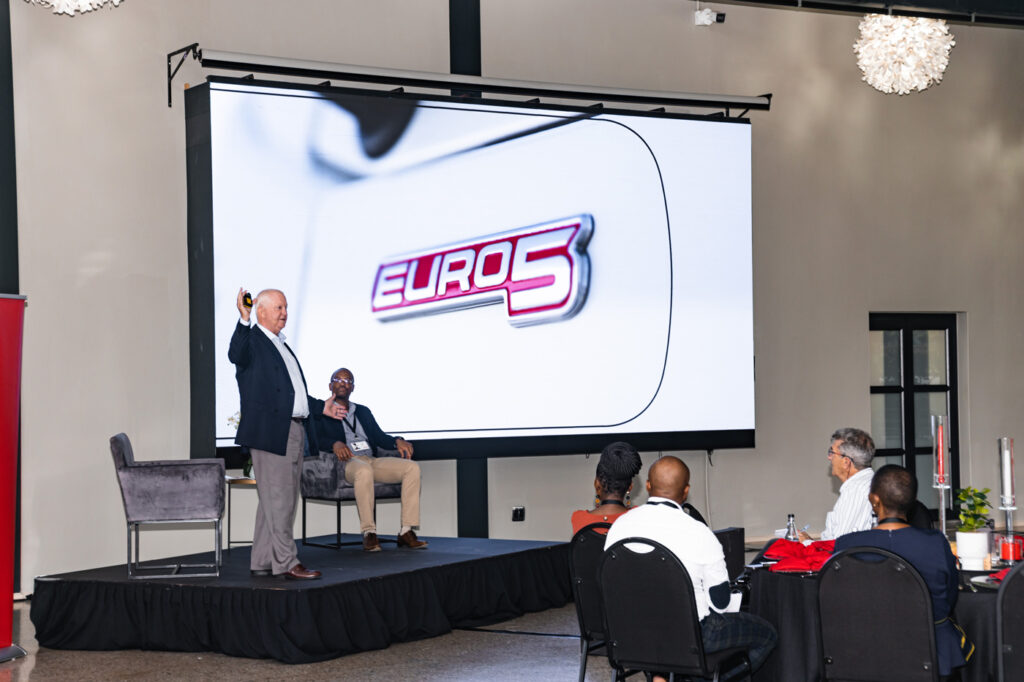ISUZU forges ahead!
ISUZU forges ahead!
ISUZU Motors South Africa had a cracker of a year in 2022, notching up its 10th consecutive year as the truck market leader. As COLIN WINDELL reports, however, it certainly isn’t resting on its laurels.
With “three exciting products” due this year, the rollout of compressed natural gas (CNG) power for selected models, and the introduction of Euro 5 engines for some variants, ISUZU is set to hit the headlines a number of times in 2023.
Sales growth
ISUZU grew its sales across the board for light, medium, and heavy commercial vehicles (LCVs, MCVs, and HCVs) through 2022. In fact, the factory in Gqeberha is running at full production capacity for a single shift when it comes to LCVs. The truck line, meanwhile, is operating at up to 80% capacity with 16 units a day coming off the line.
The South African truck market including van and bus recorded total sales of 30 153 units for the 2022 calendar year – an increase of 11.4% overall on 2021 numbers – with ISUZU registering growth of 4.7%.
Compared to 2021, the MCV market increased by 17.8%, with ISUZU sales in this category growing by 10.12%. The HCV market increased by 19.6% and ISUZU sales increased by 0.24%.
“Our growth in light of supply constraints can be attributed to the relentless hard work of the greater ISUZU team, the backbone of which is formed by our dealer network and their relationships with our customers,” says Craig Uren, senior vice president for revenue generation at ISUZU.
Adapting to challenges and moving towards a cleaner environment
Uren says that the transportation industry on a global level is in crisis in all areas, from shipping through to rail freight and road transport. This has been brought on by a series of compounding factors – from the Covid pandemic to the war in Ukraine and the semi-conductor shortage.
“Within this spectrum comes the decision as to how we position ourselves in an environment that makes it very tough to run a business,” he says.
“There is a vicious cycle of issues, including the water supply, power, rising inflation, escalated living costs, and growing unemployment. South Africa has been severely tested… we are resilient, however, and will find a way to thrive,” he continues. “The need for truck transport is not going away, but we do need to adapt to managing the business of running trucks in the current environment.”
Uren says ISUZU is acutely aware of the need to move forward towards a cleaner environment in line with global trends, and to work within a plan of environmental, social, and corporate governance. In this vein, ISUZU introduced Euro 5 technology into its New Generation (NG) N and F series truck ranges in May last year, with more advances to come. “In the short-term, we will move to dual-fuel capability on all our models, with CNG offered on selected variants, while we will also expand the Euro 5 rollout,” he reveals. “In the medium-term, we will introduce battery electric options on selected models, with the long-term possibility of alternative technology on selected models.”
Uren says business in this country isn’t a bed of roses: “Although 2022 was the best market year to date, with 30 153 units and improved ISUZU sales, the failing power infrastructure in South Africa is having a visible impact on all business operations. Sadly, it is also likely to be with us for some time.
“In the extra heavy-duty category, it was the biggest market year ever. Some of this can be ascribed to the fact there are so many more trucks on the road because of the failure of Transnet. On the other hand, in the medium sector, we are seeing how small businesses are struggling to finance new vehicles,” he continues.

Proactive customer solutions
Uren notes that to make it easier for customers, ISUZU has been proactive in developing solutions such as the ISUZU Mobility Cents Per Kilometre (CPK) maintenance contract. This is based on actual kilometres travelled and can be applied to all new ISUZU trucks with less than 9 000 km on the odometer while under 12 months old at point of sale.
“The CPK plan allows the company to match its revenue generated by a particular vehicle to the actual expense incurred in a particular month. It also follows seasonal trends such as limited distances covered during low season,” he explains. “In addition, should a vehicle be off the road for crash repairs, there will be no maintenance charges in the absence of kilometres covered.” Uren highlights the fact there is no minimum billing per month, meaning that businesses can maximise their cash flow, paying monthly only for the kilometres driven rather than the distance predicted.
Support for customers also comes in the form of fleet management solutions. “The entire ISUZU range is telematics-ready, with stolen vehicle recovery hardware installed at the factory,” notes Uren. “This includes a panic button and driver ID tag reader already installed. Compatible with the MiX Telematics fleet management system, it is also compatible with existing third-party fleet management systems at a small additional cost.”
This is one of many services provided by the company. “We are proud to offer ISUZU operators a complete suite of services and our package of solutions is captured in the ISUZU tagline ‘With you for the long run’,” emphasises Uren.
Continental growth and cooperation
South Africa is not an isolated entity and the truck market in Africa is growing, with a slow move away from second-hand imports of questionable quality to warranty-backed new vehicles.
ISUZU is an exporter to these markets: currently, it supplies D-Max bakkies in both left- and right-hand drive to the whole continent except for North Africa, with trucks being sold in various Southern African Development Community (SADC) countries. Gen 6 single cab bakkies are both exported and retained locally as a business workhorse to assist entrepreneurs, while the far more upmarket Gen 7 D-Max double cab is targeted at the local leisure market. “Buyers in other Africa countries prefer the older generation because it is a tried-and-tested model with less of the in-cabin tech that is included in the new version,” explains Uren.
He is upbeat about prospects for the continent: “Last year, 25 000 new ISUZU trucks were sold in African countries and, while this does not seem to be a large number, it is growing and the full potential of this market is slowly being realised. Kenya is a major market and ISUZU East Africa is a big operation as an assembler of semi knocked down (SKD) truck units, although unfortunately a variety of factors have meant that a SKD factory planned for Ghana has had to be delayed for the time being.”
Strengthening cooperation across Africa can only help to improve these prospects, as Uren points out: “The African Continental Free Trade Area (AfCFTA) agreement is vital for the whole of the continent, and we are working closely with the African Association of Automotive Manufacturers (AAAM) to develop and implement strategies for cooperation and growth throughout the continent.”
Published by
Focus on Transport
focusmagsa




